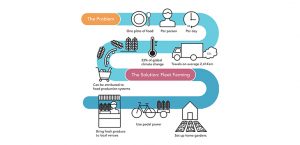
Fleet Farming strives to reduce the environmental impact of food production through a pedal-powered and a hyper-local urban farming model that creates a culture of healthy and vibrant ecosystems, by transforming unproductive, wasteful lawns into community-driven urban farm plots or a ‘farmlette’.
A farmlette is a lawn that is converted into a food-producing plot at least 50m2 in size, consisting of row crops grown directly in the ground. Landowners donate their land for an agreed two-year period with a suggested donation of $500 to cover the start-up costs. Plot owners are entitled to a personal supply of veggies, while Fleet Farming is responsible for the growing, harvesting and sale of the produce to local restaurants and farmers’ markets.
Run entirely by volunteers, Fleet Farming only uses bicycles in an effort to eliminate nearly all fossil fuel consumption during the growing and transportation cycle, in addition to preventing emissions produced from mowing lawns. The conversion of lawns into productive farmlettes also reduces the use of harmful pesticides and fertilizers. Following the first pilot program that took place in Orlando, Florida in 2014 the project has now become so successful there is a waiting list of farmlette applicants.